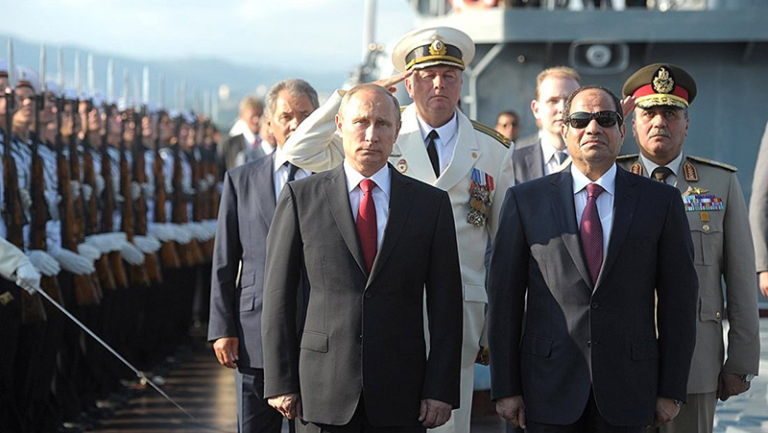
On August 22nd, Egypt’s Minister of Defense and Military Production Mohammad Zaki made a trip to Russia with a high-level military delegation. Zaki attended the seventh meeting of the Egyptian-Russian Joint Military Committee and met with several Russian officials. His visit to Moscow underscores the growing special relationship between Russia and Egypt, particularly since the coup of 2013 that toppled President Mohamed Morsi. Since ascending to power in 2014, Egypt’s President Abdel-Fattah el-Sisi has invested heavily in his relations with Russia’s President Vladimir Putin. Sisi views Putin as a key ally and considers the relations between Moscow and Cairo as a cornerstone of Egypt’s foreign policy. However, Egypt’s growing relations with Russia raise serious questions, such as the following: To what extent do they represent a shift in Cairo’s position toward global powers? What is the impact of these relations on Egypt’s long-standing partnership with the United States?
Mutual Interests
Relations between Egypt and Russia go back decades. They reached new heights in the past eight years, and especially since Sisi came to power in 2014. President Sisi seems keen to build a strong partnership with Moscow for different reasons, among them balancing Egypt’s foreign relations and benefiting from Russia’s increasing influence in the Middle East. Sisi also clearly admires Putin as a ruler. For him, investing in the relationship with Moscow helps Egypt to balance its foreign relations with global players, chiefly the United States and European countries, which have criticized Egypt’s gruesome record of human rights violations. An authoritarian himself, Putin couldn’t care less about the issues of human rights and democracy in Egypt.
For Sisi, investing in the relationship with Moscow helps Egypt to balance its foreign relations with global players, chiefly the United States and European countries.
Russia’s growing presence and influence in the region, from Iran and Syria to Turkey, Libya, Algeria, and the Gulf countries, has made it a vital player in the region. Building strong relations with Russia not only would enable Egypt to rebuild its regional weight and image but also help it to counterbalance the growing influence of other regional players, notably Turkey and Iran. In turn, Moscow is counting on Cairo to solidify its great-power influence in the region. As the largest Arab country, Egypt can play a key role in conflict zones such as Libya and Syria. In fact, Cairo and Moscow tend to coordinate their positions on these two issues in order to achieve their mutual regional interests.
Furthermore, Sisi and Putin share similar world views whether about dealing with domestic opposition—which both do not accept or tolerate—or regional issues in Syria and Libya as well as political Islam. Both leaders disdain basic democratic and human rights principles and prefer using coercion against political opponents no matter the consequences. They also vehemently reject and rebuff any external criticism or pressure to respect human rights; in fact, they consider such critique a national insult that necessitates strong condemnation. These personal traits make Sisi and Putin a perfect match in an era of erosion of democracy and the growing “strongman model” around the world.
A Growing Partnership
As evidence of Egypt’s deepening relations with Russia, in October 2018, Sisi and Putin signed a comprehensive partnership agreement during the former’s fourth visit to Moscow. The agreement covers military, security, trade, and economic aspects of cooperation. In December 2020, the Egyptian parliament ratified1 another comprehensive agreement between Egypt and Russia. According to the agreement,2 the two countries agreed to exchange regular visits at the presidential level and the level of foreign and defense ministers. It also included provisions about fighting terrorism and cooperating on military, economic, trade, scientific and technical matters, tourism, and youth. Importantly, the agreement is valid for ten years and will be “automatically extended for subsequent five-year periods, if neither party notifies [the other] in writing through diplomatic channels of its intention to terminate it no later than six months before the expiration [of the agreement].”
It is noteworthy that economic exchanges and trade between Egypt and Russia have expanded significantly.
It is noteworthy that economic exchanges and trade between Egypt and Russia have expanded significantly. According to the Russian ambassador in Cairo, Georgy Borisenko, bilateral trade3 between Cairo and Moscow reached $6.2 billion in 2019, including $5.7 billion in Russian exports to Egypt, which makes it the largest trading partner for Russia in the Middle East and Africa and places Russia as the third most important partner for Egypt after the European Union and China. Borisenko also pointed out that major Russian companies, including Rosneft, Lukoil, and Lada, are operating in the Egyptian market with investments exceeding $7.4 billion. Moreover, Russia and Egypt signed an agreement to establish a Russian industrial zone in East Port Said, which is expected to increase the number of Russian companies and investments. According to Borisenko, Russia plans to invest over $7 billion to establish its industrial zone, and this would create around 35,000 jobs for Egyptians. Russia is also the largest grain exporter to Egypt, providing for a majority of Egypt’s demand, and agricultural products represent nearly 80 percent of Egypt’s exports to Russia, making the latter one of the major importers of Egyptian vegetables and fruits
Importantly, Egypt is one of the favorite destinations of Russian tourists. Until 2014, Russia dominated the tourist market in Egypt as the number of Russian tourists surpassed 3.1 million that year, nearly 33 percent of the total number. Also, on August 9, 2021, Russia resumed its flights to the Red Sea resorts, ending a ban that lasted about six years after the bombing of a Russian airliner following takeoff from Sharm el-Sheikh resort, killing all 224 people on board.
Bolstering Military Cooperation
Egypt has also become one of the key weapons importers in the Middle East. According to the Stockholm International Peace Research Institute’s (SIPRI) 2021 report, Egypt’s arms imports increased by 136 percent between 2011–2015 and 2016–2020. A fact sheet by SIPRI in 2020 notes that, “Egypt was the third-largest arms importer in the world in 2015–19. Its arms imports accounted for 5.8 per cent of the global total and were 212 per cent higher than in 2010–14.” In order to modernize and diversify its arms arsenal, Egypt widened and enhanced its military relationship with different partners over the past eight years. It signed several arms deals with Russia and France. According to an Egyptian official,4 Egypt spent around $15 billion between 2014 and 2017 on arms purchases, of which Russia’s share constituted 60 percent.
According to an Egyptian official, Egypt spent around $15 billion between 2014 and 2017 on arms purchases, of which Russia’s share constituted 60 percent.
In fact, military cooperation is a key element in the growing relations between Egypt and Russia. Since 2014, Egypt signed several military deals to buy Russian weapons including fighter jets, assault helicopters, air defense systems, and frigates. More significantly, Russia will build Egypt’s first nuclear power plant, which is estimated to cost $25 billion. According to Amjad Al-Wakeel, chairman of Egypt’s Nuclear Power Plants Authority, Moscow will finance 85 percent of the project “through a Russian loan that Egypt will start repaying in October 2029 through semi-annual instalments over 22 years at an interest rate of 3%. Egypt’s government will cover the rest of the cost, whether from the public treasury or through local banks.” Both countries have reached5 agreements on military-technical cooperation at the cost of $3.5 billion which included the deliveries of 46 MiG-29 fighters and 46 Ka-52K Alligator helicopters. In addition, in May 2017, Russia won a tender to supply Egypt with Ka-52K, a ship-based reconnaissance and combat helicopter, to be placed on board the Mistral helicopter carrier, which Egypt obtained from France in 2015. Egypt and Russia have also held several joint military exercises since 2016 that have bolstered the military relationship between the two countries.
Implications for US-Egyptian Relations
The growing cooperation between Egypt and Russia should be read within the wider context of US-Egypt relations. Egypt has been a key regional partner of the United States over the past five decades. The two countries have developed a special relationship with the result that Egypt has become one of the largest recipients of US foreign assistance in the world, for a total of approximately $1.4 billion in military and economic aid. However, since Egypt’s January uprising of 2011, bilateral relations between Cairo and Washington suffered many setbacks, particularly after the coup of 2013 and the reemergence of authoritarianism in Egypt. Between 2013 and 2015, the Obama Administration suspended a part of the US annual military aid to the country as a reaction to the Egyptian government’s brutal violence against protests in 2013. Sisi responded by visiting Russia several times between 2014 and 2018 and strengthening Cairo’s relations with Moscow. Even after the Obama Administration resumed military aid in March 2015, Sisi signed several military deals with Russia. He also extended the economic, security, and geopolitical partnership with Russia, which put him at odds with the United States.
Egypt’s growing relations with Russia, a major foe of the United States, has placed it in an uncomfortable position with the Biden Administration.
Against this backdrop, Egypt’s growing relations with Russia, a major foe of the United States, has placed it in an uncomfortable position with the Biden Administration. Apparently, Sisi is playing his cards with the United States and attempting to instrumentalize his relations with Moscow in order to gain Washington’s attention. Russia seems to be aware of Sisi’s strategy and, in turn, is using it for its own purposes; however, this is a highly risky game that can backfire and jeopardize Egypt’s relations with one of its key partners. In fact, in 2019 Cairo was close to being hit with US sanctions because of its move to acquire Russian-made Sukhoi Su-35 aircraft. That was during the Trump Administration, when, ironically, Sisi was viewed as President Donald Trump’s “favorite dictator.”
Indeed, the question of how far Egypt can go in its relationship with Russia depends on how much Washington can accept and tolerate this behavior. Egypt’s plan to try to hedge against American pressure may prove risky and detrimental. But for now, Cairo seems comfortable following that path, hoping that it will serve its interests in the long run.
1 Source is in Arabic.
2 Source is in Arabic.
3 Source is in Arabic.
4 Source is in Arabic.
5 Same Arabic source.

